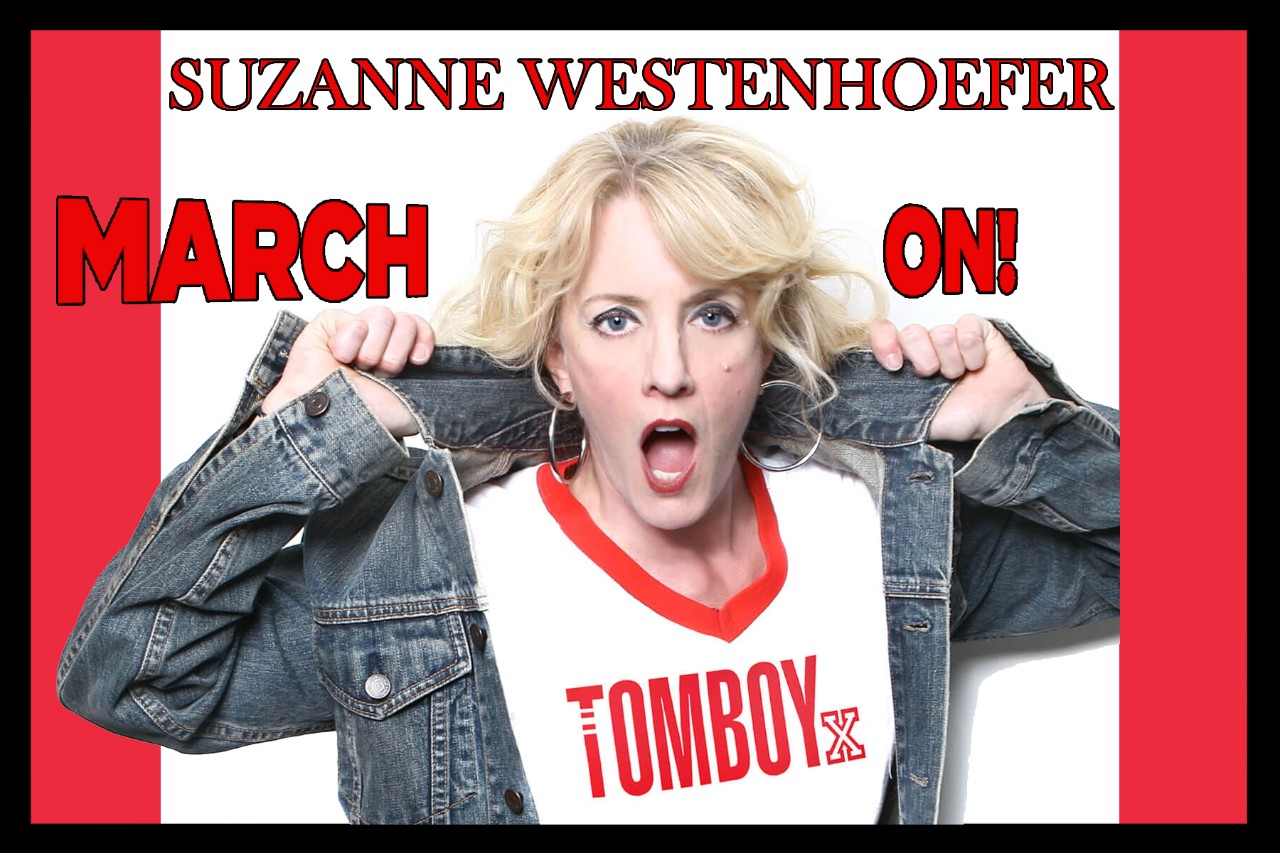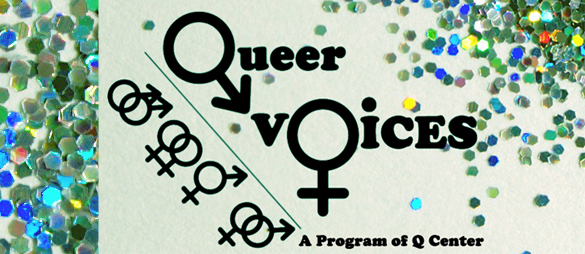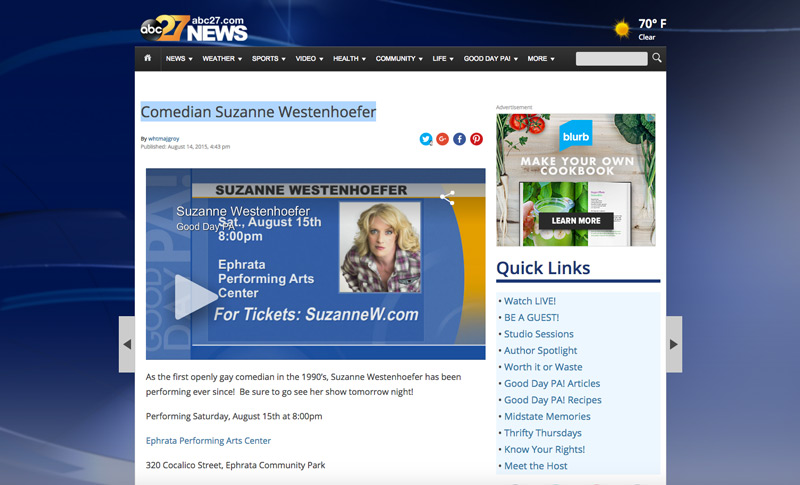Originally published by Los Angeles Blade on March 13th, 2019.

By Scott Stiffler
Town to town, gig to gig, the life of a stand-up comic is one long road trip — but Suzanne Westenhoefer won’t have to stray too far from home, when a March 16 booking takes her to the Los Angeles LGBT Center’s Lily Tomlin/Jane Wagner Cultural Arts Center.
The trailblazing lesbian comedian moved to West Hollywood in 1996, when Boys Town was “already well under its fabulous way,” and has been living in her present location, one block outside of WeHo, for nearly 20 years — all the while, making her living as a so-out-she’s-never-been-in entertainer.
“I have a white picket fence,” Westenhoefer said, of the home she shares with Jeanine, her lover. (“How very ’80s,” she observed, of that self-supplied term.)
“Across the street from me, I’m looking at another white picket fence. Could you be more American, normal, straightlaced than that? No.”
But walk two blocks in any direction, she said, of her “little residential chunk,” and “… you can get a tattoo, you can go see strippers, you can probably get heroin. We’re between Sunset Boulevard and Santa Monica Boulevard. So, interesting, interesting hood.”
Fans of “The L Word” will likely recognize it. One of those houses across the street, Westenhoefer noted, “was the house they were using for Bette and Tina’s. My house was in the opening credits.”
It’s been a full decade since the final episode of that five-season series, whose layered depictions of lesbians delivered unprecedented visibility to the masses (or at least Showtime subscribers) — but not for nothing, it must be noted that Westenhoefer, 58, was uttering the “L” word, in full, years before the show’s cheeky use of capital letter as code.
Westenhoefer was the first openly lesbian comic to appear on “Late Night with David Letterman” and have her own HBO special (1994). Today, she finds herself in a cultural moment barely imaginable when she first took to the stand-up stage, on July 31, 1990. (“It was an open mic contest in NYC, and I won $25!!!)
“It seems crazy now,” Westenhoefer said, “but then, we could name the openly gay comics on one hand. Open another if you wanted to do openly lesbian folk singers. But that was it.”
The Pennsylvania native and Clarion University graduate moved to Richfield Park, NJ in 1983, to “become a big Broadway star!” Coming up short on work, she found herself plunged into activism.
“That is when the shit hit the fan,” she recalled, when “every gay guy in New York got sores on their body, and died in a week… or that’s how it felt. Initially, it wasn’t event called AIDS. They called it ‘gay cancer.’ Uhh, that was fun.”
ACT UP and Queer Nation, both of whom she was “one of the foot soldiers” for, had a series of public actions in which, Westenhoefer noted, “The whole idea was to create trouble, to get on the news so we could get the president to acknowledge that AIDS existed, and help us… Some people were saying, ‘We have to out famous people, because by them not being out, they’re hurting us.”
During that time, Westenhoefer recalled “putting up a sign with [a picture of] Jodie Foster, that said ‘Absolut Queer’ [referencing a vodka ad campaign]. We’d put them up at night, and people would wake up to them. The truth is, I remember thinking, ‘I don’t know if this girl is really gay, or we just think she’s gay.’ I mean, nobody knew for sure. Gosh, that seems kind of tacky. Oh, well, you gotta do what you gotta do.”
During that time, while working as a bartender at Houlihan’s in Secaucus, NJ, customers ate up the sardonic humor she served, drawing favorable comparisons to talent booked on late night talk shows and comedy showcases. (Cheap to produce, and a source of programming for the burgeoning cable TV industry, brick wall and mic stand-up showcases were ubiquitous at the time.)
Recalling a conversation with a Houlihan’s regular who challenged her to try stand-up, Westenhoefer told him, “I don’t know. I won’t be closeted, and what if they boo me off stage when I announce I’m lesbian? And he said, ‘Yeah, ’cause you’ll never get another job BARTENDING.’ He just cut right to the quick. I’ll never forget it.”
Five months into her stand-up career, a producer from the “” saw Westenhoefer’s set at an open mic night in Greenwich Village, and asked, “ ‘Would you be interested in TV?’ And I said, That’s the point.”
Soon thereafter, Westenhoefer was beamed into the homes of America, on an episode called “Lesbians Who Don’t Look Like Lesbians.”
“It’s funny,” she recalled, “because that would be insulting now. But that stuff has changed so dramatically… When I was in my 20s, I said the word ‘fag’ all the time, because gay guys taught me to say that. ‘Hey, faggot.’ That’s how we spoke.” Now, Westenhoefer duly noted, “that would be incredibly insulting… The first transgender folks I met, they said, ‘Oh god, don’t call me transgender. I’m a trannie.’ Now, if you said that…”
No matter. For Westenhoefer, performing has always been a clear-cut case of saying what’s on her mind, consequences be damned. Pitchforks and protest signs haven’t been a problem, though, perhaps owing to the fact that there’s something disarming about her delivery and demeanor, that quicksilver quality that some comedians just have.
Then there’s the material, a mix of the personal and the mundane. A good example is her routine about shopping at Home Depot, as the unskilled, designated buyer.
“The difference being,” Westenhoefer said, “it was a girlfriend at home who could build, and, as a lesbian, I couldn’t… I don’t think I ever did any material that a straight person can’t possibly understand.”
Suzanne Westenhoefer returns to the Los Angeles LGBT Center’s Lily Tomlin/Jane Wagner Cultural Arts Center on Sat., March 16, at 8 PM. General admission tickets, $40, include the show and after party. VIP tickets, $60, include the same, plus pre-performance hosted wine and cheese reception, and preferred seating for the performance. To order, visit lalgbtcenter.org/theatre or call 323-860-7300. Net proceeds from ticket sales will benefit the full range of the Los Angeles LGBT Center’s free and low-cost programs and services.



